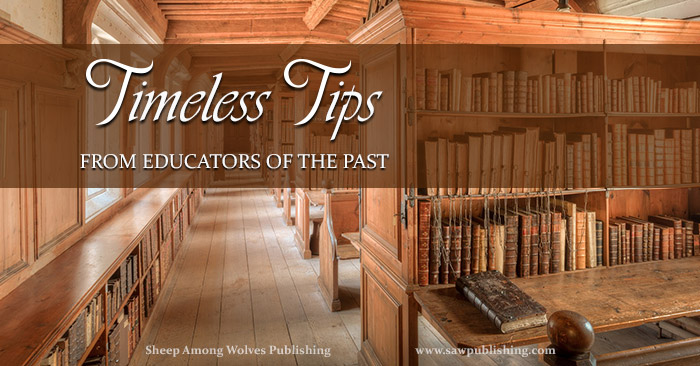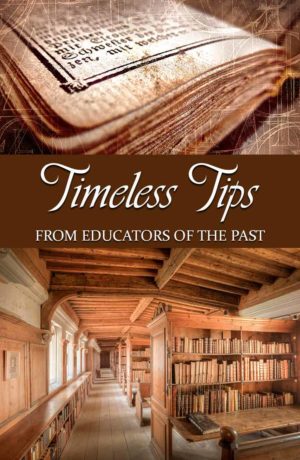Timeless Tips from Educators of the Past
 Have you ever wondered whether there’s somebody out there who has figured out your problems?
Have you ever wondered whether there’s somebody out there who has figured out your problems?
As you struggle through teaching your ten-year-old a math lesson which she can’t (or won’t) understand, and your seven-year-old is doodling on his copy-work page, while your eighteen-month-old is crawling all over the table, and you don’t even want to think about the pair of preschoolers playing none-too-amicably in the other room—would you be glad of advice from someone who had solved some of your challenges, and could give you some useful strategies for overcoming the problems that seem to be overcoming you?
Perhaps you think I don’t know of such a person. And perhaps—in a way—I don’t. But what I do know is that you don’t have to find such a living person to solve your problems. I do know that there are many Timeless Tips from educators of the past, who have found solutions to problems we still face today.
Most Teaching Challenges are not New
The challenges of education are not a recent dilemma. Yes, different challenges surface or resurface with different generations, but most of these difficulties have been faced time and time again in the past.
People in history have struggled with the same elements of human nature and human limitations which we struggle with today. And many of these people have come up with workable solutions.
Just as the homemakers of the past provide incredible tips and tidbits for the godly and virtuous management of our homes, so the educators of the past hold out a wealth of resources and techniques that allow us to be successful in the training of another generation.
Patterned after our Timeless Tips from Homemakers of the Past, our new series, Timeless Tips from Educators of the Past, explores and highlights helpful snippets from the writings of history.
 Older Opinions are Valuable
Older Opinions are Valuable
The people of the past are not always better or wiser than those of the present, but they have experienced and overcome many difficulties we struggle with today. There is great value in the habit of respecting the experience of those who have gone before, and gleaning truth from their wisdom wherever we can.
Sir Isaac Newton once famously declared: “If I have seen further it is by standing on the shoulders of giants.”
When I look back at Sir Isaac Newton, I’m always amazed at this comment, because to my notions, he is himself one of the greatest giants! This spirit of humility is an excellent pattern for our approach to the wisdom of our forefathers.
Don’t approach the past blindly, but do approach it humbly. We can learn from people even if we cannot wholly imitate them.
Educators of the Past Offer a Wealth of Material
One of the great advantages of drawing from the work of past educators is that their materials are widely available free of charge. Using public domain sources gives you the ability to freely experience the following educational materials and advantages:
- Complete textbooks for all standard subjects.
- Auxiliary material (supplementary reading, historical fiction, biographies, etc.).
- Opportunity to view and compare full courses before downloading.
- Legal authority to alter and edit downloaded material (check regulations of individual sources).
- Access to material from a wide variety of educational theories and models.
Naturally, with all these perks, there will be a few downsides. Here are several cautions regarding public domain educational resources:
- Some subjects, particularly science courses, may contain outdated material.
- The large majority of authors (although not all) write from the perspective of a model other than homeschooling.
- As always, the flaws of an author’s worldview will come through in their writing. The authors of the past, just like those of the present, must be read with discernment.
- In highlighting Timeless Tips from a given author, SAW Publishing is not necessarily recommending the whole of that author’s work. Unless otherwise stated, we are quoting from, not reviewing, the sources mentioned.
As with so many things, the greatest advantages of public domain access are closely linked to its greatest dangers. The wide range of available materials means tremendous flexibility and variety, and also the need for an equal amount of caution.
If you are unfamiliar with public domain sources, our previous post, Good Books from Digital Archives, is an excellent starting place.
Timeless Tips from Educators of the Past – An Ongoing Series
It’s true that there’s no one person who can solve all your problems. But it’s also true that reading and heeding the wisdom of the past can give us many little tricks and techniques that can lighten our load in surprising, and often simple, ways.
Timeless Tips from Educators of the Past is an ongoing series that draws from this wealth of historical wisdom, in an endeavour to help and encourage moms like you—moms that believe in personally investing in educating their children, but don’t yet have it all figured out.
Maybe these tips won’t cure your seven-year-old of doodling. They certainly won’t prevent the baby from crawling on the table. But they might just give you the little shortcuts and methods which improve your homeschooling experience, and make this commitment the daily blessing which it was intended to be.
Here is a full list of Timeless Tips from Educators of the Past:
- How to Teach Your Students to Think
- How to Replace Geography Quizzes with Geography Games
- Do You Know What They’re Reading?
If you’re interested in other Timeless Tips, take a look at our previous series, Timeless Tips from Homemakers of Past, and find useful information on a range of daily challenges from dealing with mosquito bites to threading a needle:

You might also enjoy:

Have you ever asked a friend where she keeps her dust cloths? This Timeless Tip suggests that maybe we’ve been viewing dusting in the wrong way.

Would you like to memorize, but just can’t find the time? Today’s Timeless Tip from Homemakers of the Past offers a valuable secret for making the most of the minutes you already have.

Pro-life, pro-choice, or pro-active? What stance will you take and how will it affect your decisions and actions in the stand for the life of the innocent?
- How to Give Your Kids a Solid Grasp of Grammar
- How to Make Vocabulary A Family Pursuit with the FREE Word of the Week (WOW) Program
